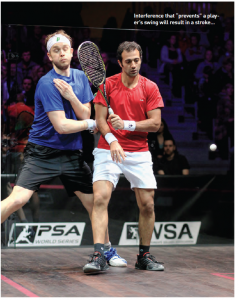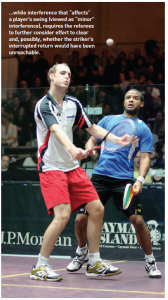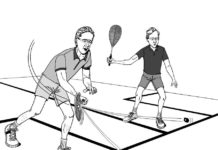By Barry Faguy
There are a whole bunch of places where the concept of ‘winning return’ appears in the rules. We don’t have the space to deal with all of them, but we’ll clear up the main ones. You’ll be doing your decision-making a favor if you use this concept properly.
Colloquially, we use the word ‘winner’ to describe a return that has actually won the rally in the positive sense (in contrast to one where the loser has hit the tin). However, the rules themselves almost always use ‘winning return’ to describe a ‘refraining’ situation—one where, had the return carried on, it would have won the rally. This implies that it was interrupted by something. That’s what we’re going to talk about here—and under two basic categories: interference…and anything else (Marker calls, distractions, and fallen objects).
These ‘interrupted winning return’ clauses always dictate a Stroke as an exception to the normally-expected Let decision. The idea is to ensure fairness. So if we created a generic, informally-worded rule to get this message across, it might look like: “Hey folks—given what just happened there, the main rule in question says that a Let is the right decision, but that wouldn’t be fair because in this case, a winning return was interrupted, so we’re going with a Stroke.”

Two points
To make this idea of an ‘interrupted winning return’ work, there are a couple of things that need to be implied—but none that demand credulity.
Perfect player concept
The first is that the winning return in question would simply need to be a routine shot that could easily be made by a player at the level of play in question. We don’t assume any special ability; we don’t assume any special outcome (like a nick); we don’t consider the possibility of that routine return being missed. To think otherwise would open the door to rampant speculation.
Player-hit-by-ball
Next, the concept doesn’t apply to those instances where a player would have been hit by the ball going directly to the front wall. For the most part, the ball would have been retrievable—which is an easy thing to confirm if you just picture the ball going through the player and rebounding off the front wall. In any case, because a Stroke is specifically mandated by one of the ‘player-hit-by-ball’ rules, it isn’t necessary to consider the issue of an ‘interrupted winning return’.
Applying ‘winning return’ to interference
The rule in question states that a stroke is awarded to the striker when we have interference which firstly, the non-striker has made every effort to avoid, but then secondly, when the striker would have made a winning return had the interference not existed. That might seem to open up a pretty broad range of situations, but only apparently so (a fact that actually makes your decision-making a little easier!). Let’s see how the concept might apply to each form of interference:
View Since the issue here is that of simply seeing the ball, denying the striker a view of it cannot of itself somehow interrupt a winning return. The striker cannot generate a winner simply by looking.
Access By definition, going to the ball is separate from the striking phase (i.e., the swing). It’s true that both are often closely linked, but nonetheless, there’s also nothing about getting to the ball that can generate a winner on its own. Only the latter (and later) act of striking the ball can be responsible for that.
Ball This form of interference (usually referred to as the ‘direct path of the ball to the front wall’) cannot produce what is called a winner either because of what we previously mentioned. In those situations, a different rule is invoked. Take note also that we are dealing only with the usual ‘direct’ path of the ball, so the well-known provision about a “potentially-interrupted” winning boast is not applicable.

Swing We’re dealing with swing interference last because within it lies the major point of this missive. You may remember from previous articles that all swing interferences are divided into two categories—known as ‘prevented’ and ‘affected’ (‘major’ and ‘minor’). The rules dealing with the swing all refer to the ‘amount’ of interference (i.e., not its effect on the outcome). Thus, if we have a lot of interference (major) to the swing that ‘prevents’ the swing motion from continuing, then a Stroke is mandated—regardless of the opponent’s effort to clear. The Stroke decision here is made on that basis, and the issue of a potential wining return being interrupted is not a consideration.
However, if we have a case of ‘affected’ (minor) swing interference (where the continuation of the swing motion would have been possible)—then you’re usually faced with this:
Given a poor clearing effort by the nonstriker, nothing further needs to be considered, and once again a stroke is mandated.
Given a good clearing effort, and with the same minor interference, a Let is mandated— and this is the typical outcome.
But, once in a while we have an exception. If we have this latter situation (minor swing interference and a good clearing effort), but the striker’s interrupted routine return would have been unreachable by the non-striker—then we’re back to a Stroke. This is in my view, for interference situations, the only place where the concept of ‘interrupted winning return’ can reasonably be applied.
Applying ‘winning return’ to non-interference issues
The following areas also contain ‘interrupted-winning-return’ provisions— meaning again, exceptions to the Let that would normally be mandated:
Marker calls Generally, when a Marker makes an incorrect call (‘Out’, ‘Down’, ‘Not Up’) which is then corrected by the Referee, a Let is played. However, there are the rare occasions where the Referee considers that a winning return was interrupted at that moment. Here’s an example: Player A makes a drop in the right front close to the tin and slips and falls—and the Marker mistakenly calls the ball ‘Down’. Player B was right there, ready to hit what is without doubt an easy cross-court winner—but now stops play because of the call. Logic and fairness (and a rule!) demand a Stroke. And if you think about it, the same would apply to the above situation even if the Referee is uncertain whether the drop was good. As the Referee, you need to be alert for such cases and have the presence of mind to ensure the fair outcome.
Distraction & Fallen Objects In this last category, we again have provisions that make an exception to the usual Let. Here’s an example, using a ‘distraction’ situation: Player A prepares to make a simple drop in the front, with Player B hopelessly out of position in the back, on the ground. Then something ordinary happens, like say, an airplane crashes into the building at that moment. Do we now have any doubt as to what the Referee should do?
So, there you have it—pretty close to everything you need to know about winning returns.





